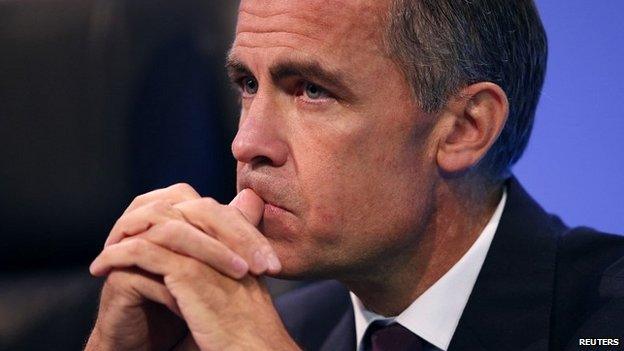UK interest rates remain at record low of 0.5%
- Published

Bank governor Mark Carney has voted to keep rates on hold at recent meetings
The Bank of England has held UK interest rates at a record low of 0.5%.
It has also decided not to extend its quantitative easing programme, designed to stimulate lending in the economy, beyond the £375bn already spent.
Rates have been at 0.5% since March 2009, with the market expecting a small rise early next year.
In two weeks, the Bank will reveal how members of its rate-setting committee voted on the rates decision. Last month, two members voted for a rise.
Ian McCafferty and Martin Weale voted to raise rates to 0.75% from 0.5%, as they had in August. The other seven members of the committee, including Bank governor Mark Carney, voted to keep rates unchanged.
This year or next?
There has been intense speculation over when the Bank will start to raise rates again.
Markets are expecting an increase some time in the new year, although some commentators think it could be later this year as the Bank may not want to raise rates close to a general election, scheduled for May 2015.
"Overall, our central case still sees the Monetary Policy Committee raising rates next month, not least because we struggle to envisage the committee either beginning to tighten in the first few months of next year, so close to May's general election, or waiting until the summer," said Philip Shaw at Investec.
The UK economy has been growing strongly this year - with GDP rising by 0.9% between April and June, following a 0.7% rise in the previous quarter - and is on course to outperform many other developed economies this year.
However, recent figures have suggested that growth in the manufacturing sector is beginning to slow, partly due to a slowdown in the eurozone economy.
In addition, the recovery in the UK economy has not filtered through to inflation, which fell to 1.5% in August. With inflation below the Bank's target rate of 2%, there is less pressure to raise rates to curb rising prices.
Noting the slowdown in manufacturing and the eurozone, together with low wage growth, Martin Beck, senior economic adviser to the EY Item Club, said: "These developments are unlikely to reverse anytime soon, so 2014 is set to pass with interest rates remaining at current rock-bottom levels.
"And while rates will probably start rising in the first quarter of 2015, the risks point to that date being pushed back further."